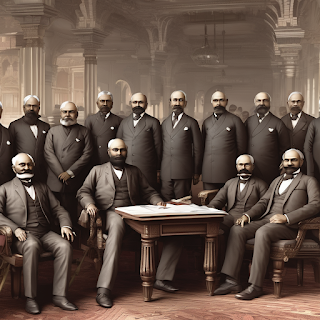Foundation of Indian National Congress (INC) in 1885
Introduction
In the annals of Indian history, the year 1885 holds immense significance as it marks the foundation of the Indian National Congress (INC). The INC, also known as the Congress Party, played a pivotal role in the struggle for India's independence from British colonial rule. This article delves into the origins, objectives, and impact of the INC, highlighting its journey from a modest beginning to becoming a formidable force in the Indian political landscape.
Origins of the Indian National Congress
The Indian National Congress was founded on December 28, 1885, at Gokuldas Tejpal Sanskrit College in Bombay (now Mumbai). The idea of establishing a political organization to represent the interests of Indians was first proposed by Allan Octavian Hume, a retired British civil servant. Hume envisioned the Congress as a platform for Indians to voice their grievances and work towards political reforms.
Objectives of the Indian National Congress
The primary objective of the Indian National Congress was to seek self-governance and political rights for Indians within the framework of the British Empire. The early leaders of the Congress aimed to promote unity among Indians and create a platform for political dialogue. They advocated for social and economic reforms, including the abolition of untouchability, women's rights, and land reforms.
Early Years and Moderate Phase
During its early years, the Indian National Congress functioned as a moderate political organization. The leaders, known as the Moderates, believed in peaceful negotiations and constitutional methods to achieve their goals. Prominent leaders like Dadabhai Naoroji, Surendranath Banerjee, and Gopal Krishna Gokhale played crucial roles in shaping the Congress during this phase.
The Moderates focused on raising awareness about the issues faced by Indians and building public support for their cause. They utilized platforms like annual sessions, public meetings, and newspapers to disseminate their ideas and mobilize public opinion. The demand for representative government, civil liberties, and economic reforms formed the core of their agenda.
Rise of Extremism and the Swadeshi Movement
As the Indian National Congress grew in popularity, a new generation of leaders emerged who were more radical in their approach. The Extremists, led by Bal Gangadhar Tilak, Lala Lajpat Rai, and Bipin Chandra Pal, advocated for more assertive methods to challenge British rule. They criticized the Moderates for their perceived lack of progress and called for direct action and mass mobilization.
The rise of extremism within the Congress coincided with the Swadeshi Movement, a mass movement that aimed to promote indigenous industries and boycott British goods. The movement gained momentum after the partition of Bengal in 1905, which was seen as a deliberate attempt to divide and weaken the Indian population. The Extremists played a crucial role in organizing protests, strikes, and boycotts, which significantly impacted British economic interests in India.
Impact of the Indian National Congress
The Indian National Congress played a pivotal role in shaping the course of Indian history. It provided a platform for Indians from diverse backgrounds to come together and fight for their rights. The Congress became a symbol of Indian unity and resistance against British colonial rule.
The Congress also played a crucial role in raising awareness about the plight of Indians and highlighting the need for political reforms. Through its annual sessions and public meetings, the Congress leaders were able to mobilize public opinion and build a strong nationalistic sentiment.
The Indian National Congress was instrumental in laying the foundation for India's independence movement. It provided a platform for leaders like Mahatma Gandhi, Jawaharlal Nehru, and Subhas Chandra Bose to emerge and lead the struggle for freedom. The Congress's demand for self-governance and political rights paved the way for the eventual attainment of independence in 1947.
Frequently Asked Questions (FAQ)
-
What were the main objectives of the Indian National Congress?
The main objectives of the Indian National Congress were to seek self-governance and political rights for Indians within the framework of the British Empire. They also aimed to promote unity among Indians and advocate for social and economic reforms.
-
Who were the leaders of the Indian National Congress during its early years?
During its early years, the Indian National Congress was led by prominent figures like Dadabhai Naoroji, Surendranath Banerjee, and Gopal Krishna Gokhale.
-
What was the Swadeshi Movement and how did it impact the Indian National Congress?
The Swadeshi Movement was a mass movement that aimed to promote indigenous industries and boycott British goods. It gained momentum after the partition of Bengal in 1905 and was closely associated with the Indian National Congress. The movement, along with the rise of extremism within the Congress, led to increased protests, strikes, and boycotts, which significantly impacted British economic interests in India.
-
What role did the Indian National Congress play in India's independence movement?
The Indian National Congress played a pivotal role in India's independence movement. It provided a platform for leaders like Mahatma Gandhi, Jawaharlal Nehru, and Subhas Chandra Bose to emerge and lead the struggle for freedom. The Congress's demand for self-governance and political rights paved the way for the eventual attainment of independence in 1947.
-
How did the Indian National Congress impact Indian society?
The Indian National Congress had a significant impact on Indian society. It raised awareness about the issues faced by Indians and advocated for social and economic reforms, including the abolition of untouchability, women's rights, and land reforms. The Congress's efforts helped shape a more inclusive and progressive society in India.




Comments